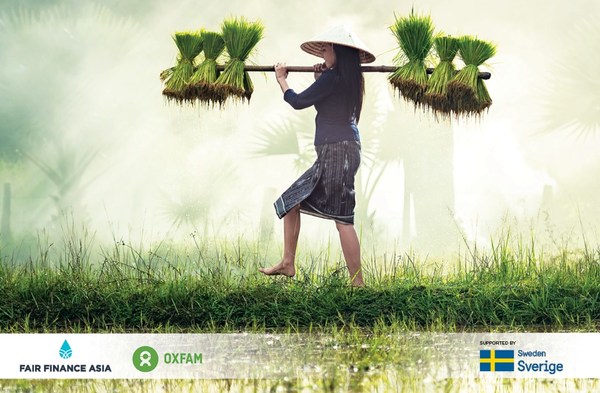PHNOM PENH, Cambodia, Oct. 21, 2022 /PRNewswire/ -- Fair Finance Asia (FFA) and the Gender Transformative and Responsible Agribusiness Investments in Southeast Asia (GRAISEA) launched a policy brief, "Enabling Stronger Due Diligence in the ASEAN's Financial Sector," which has also been submitted to the 2022 ASEAN Chair under the Royal Government of Cambodia ahead of the ASEAN Summit in November.

FFA and GRAISEA. (2022). Harvesting inequality: The social impact of financial institutions’ investments in Asia’s agribusinesses.
The policy brief recommendations were synthesized and refined during a multi-stakeholder dialogue, "Galvanizing Sustainable & Responsible Finance in ASEAN," held in Cambodia last month. This dialogue brought together representatives from the Cambodian government and parliament, and ASEAN's private sector and civil society to engage with the key findings and recommendations from the joint FFA-GRAISEA report, "Harvesting Inequality: The Social Impact of Financial Institutions' Investments in Asia's Agribusinesses."
"Our policy recommendations call to action the ASEAN financial sector and leaders to mitigate the social risks and harms in the agribusiness sector by enabling stronger due diligence and impact assessments," said FFA Program Lead Ms. Bernadette Victorio. "The slow progress in implementing financial sector policies that adhere to international norms and conventions, combined with weak checks and balances at the regional and national levels often lead to continued human rights, labor rights, and women's rights violations. ASEAN governments and financial institutions must do more to commit, in policy and in practice, to respecting and upholding international human rights conventions and global standards in responsible finance."
As a follow-up to the FFA-GRAISEA's "Harvesting Inequality" report, the policy brief iterates that, "despite government regulations on labor rights and gender equality, workers in the food and agriculture sector [in Asia], are still subjected to unequal conditions." Citing evidence from the report, the policy brief asserts that financial institutions contribute to this inequality by performing "poorly in addressing sustainability issues pertaining to gender equality, labor rights, and transparency and accountability," even as they do better in addressing financial inclusion. Specifically, FFA-GRAISEA's "Harvesting Inequality" report found that 54 highly consequential financial institutions active in the 13 Asian countries scored, on average, 2 out of 10 for Gender Equality, Human Rights, Labor Rights, and Transparency and Accountability, based on Fair Finance Guide International Methodology (FFGI) criteria.
"Now is the time for the financial sector to finally take gender equality seriously, which would not just benefit the financial sector as a whole, but also support agribusinesses that rely on an inclusive investment environment," said GRAISEA Program Lead, Ashley Aarons. "The recommendations in this policy brief reflect GRAISEA's belief that the financial sector has a huge role to play in promoting resilience and recognizing the rights and agency of women and men farmers to contribute to the agricultural value chain and reduce poverty and inequality in the long run. This policy brief aims to accelerate responsible financing and investments in the agribusiness sector, enabling financial institutions to create strong policies on human rights and women's rights that have a positive impact on the way that the financial sector does business."
The policy brief covers four broad policy recommendations for ASEAN governments:
In each recommendation, the policy brief offers recommendations specific to Cambodia's context.
"Oxfam is excited to submit this policy brief on sustainable finance and gender issues in the agribusiness sector to the ASEAN Chair under Cambodian in 2022 and the Royal Government of Cambodia," said Oxfam in Asia Regional Director Mr. John Samuel. "These policy recommendations will be key to mitigating the many socially harmful practices in Asia's agribusiness sector, such as gender-based discrimination, chronic poverty, low wages, illness, injury, and exploitation. Oxfam calls on ASEAN, Asian governments, and financial institutions to ensure that the rights of women farmers and workers, and other marginalized groups in the agribusiness sector, are protected."
To access the full Policy Brief, please visit: https://bit.ly/3z0IDXj
For more information please contact:
Kyle Cruz
Communications Coordinator
Fair Finance Asia
For further information on the issues raised in this policy brief, please e-mail info@fairfinanceasia.org, advocacy@oxfaminternational.org.
About FFA
Fair Finance Asia (FFA) is a regional network of Asian CSOs committed to ensuring that financial institutions' funding decisions in the region respect the social and environmental well-being of local communities.
For more information about FFA, visit: https://fairfinanceasia.org/
Follow us on Twitter: @FairFinanceAsia
About GRAISEA
Oxfam's Gender Transformative and Responsible Agribusiness Investments in South East Asia (GRAISEA) program is a regional program funded by the Embassy of Sweden in Bangkok. GRAISEA aims to improve the livelihoods of small-scale producers in the agribusiness sector in Asia through inclusive value chains and responsible business practices that drive women's economic empowerment, integrate human rights, and improve communities' resilience to climate change.
For more information about GRAISEA, visit: https://graisea.github.io/